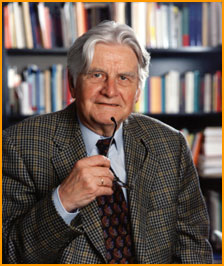Karl-Otto Apel facts for kids
Quick facts for kids
Karl-Otto Apel
|
|
|---|---|
 |
|
| Born | 15 March 1922 |
| Died | 15 May 2017 (aged 95) Niedernhausen, Germany
|
| Alma mater | University of Bonn |
| Era | Contemporary philosophy |
| Region | Western philosophy |
| School | Continental philosophy Critical theory Pragmatism |
| Institutions | University of Mainz University of Saarbrücken University of Frankfurt am Main |
|
Main interests
|
Philosophy of language, ethics |
|
Notable ideas
|
Transcendental pragmatics |
|
Influenced
|
|
Karl-Otto Apel (born March 15, 1922 – died May 15, 2017) was an important German philosopher. He was a professor at the University of Frankfurt am Main. Apel focused on the philosophy of language, which explores how language works and how it affects our understanding of the world. He created a special way of thinking called "transcendental pragmatics."
Contents
Life of Karl-Otto Apel
Apel grew up in Germany during a time of big political changes. This was the Weimar Republic period. In 1940, he volunteered for the army with his classmates. This was during World War II.
After the war, from 1945 to 1950, Apel studied at the University of Bonn. He first studied history and the history of ideas. Later, he decided to focus on philosophy. In 1950, he earned his doctorate degree from Bonn. His main topic was the philosopher Martin Heidegger.
Academic Career and Achievements
Apel became a lecturer at the University of Mainz in 1961. A lecturer is like a teacher at a university. He then became a full professor of philosophy. He taught at the University of Kiel from 1962 to 1969. After that, he taught at the University of Saarbrücken from 1969 to 1972.
From 1972 to 1990, he was a professor at the University of Frankfurt am Main. In 1990, he became a professor emeritus. This means he retired but kept his title. He also taught as a guest professor at many universities around the world.
In 1989, he became a member of the Academia Europaea. In 1993, he joined the Academia Scientiarum et Artium Europaea. These are groups of important scholars. In 2001, he received a special award from Germany. It was the Order of Merit of the Federal Republic of Germany.
Apel's Philosophical Ideas
Karl-Otto Apel worked on several areas of philosophy. These included ethics, the philosophy of language, and human sciences. Ethics is about what is right and wrong. Human sciences study human behavior and society. He wrote many books and papers, mostly in German.
Apel's ideas brought together different ways of thinking. He combined analytical and Continental philosophy. He also used ideas from pragmatism and critical theory. Critical theory is a way of looking at society to understand and change it. It came from the Frankfurt School.
Apel developed his own special way of thinking. He called it transcendental pragmatics. This idea looks at how we communicate and understand each other. He believed that communication is very important for how we think and learn.
Understanding and Explanation
In one of his books, Understanding and Explanation, Apel talked about two ways of knowing things. These are understanding (Verstehen) and explanation (Erklärung). Understanding means trying to see things from someone else's point of view. Explanation means finding the causes of things.
Apel connected these ideas to how we use language. He worked with another philosopher, Jürgen Habermas. Together, they developed ideas about "communicative action" and "discourse ethics."
Discourse Ethics
Discourse ethics is a way to figure out what is right through fair discussion. Apel believed that people should talk things through. They should listen to each other's reasons. This helps them reach agreements that everyone can accept. He thought that good communication is key to solving problems.
Apel also studied the work of Charles Sanders Peirce. Peirce was an American philosopher. Apel was even the president of the C. S. Peirce Society.
Apel also disagreed with some ideas of Karl Popper. Popper was another famous philosopher. Apel argued that Popper's ideas had a "pragmatic contradiction." This means that some of Popper's ideas didn't quite fit with how people actually use language and communicate.
From the 1970s to the 1990s, Apel's ideas influenced many philosophers. His work was important in Europe, the Americas, and Asia. Karl-Otto Apel passed away in 2017 at the age of 95.
List of Works
- Analytic Philosophy of Language and the Geisteswissenschaften (1967)
- Hermeneutik und Ideologiekritik (1971)
- Sprache, Brücke und Hindernis (1972)
- Dialog als Methode (1972)
- Transformation der philosophie: Sprachanalytik, Semiotik, Hermeneutik (1973)
- Transformation der philosophie: Das Apriori der Kommunikationsgemeinschaft (1976)
- Sprachpragmatik und philosophie (1976)
- Neue Versuche über Erklären und Verstehen (1978)
- Die Erklären/Verstehen-Kontroverse in Transzendentalpragmatischer Sicht (1979)
- Towards a Transformation of Philosophy (1980 & 1998)
- Charles S. Peirce: From Pragmatism to Pragmaticism (1981)
- Understanding and Explanation: A Transcendental-Pragmatic Perspective (1984)
- La comunicazione umana (1985)
- Diskurs und Verantwortung: Das Problem des Übergangs zur Postkonventionellen Moral (1988)
- Towards a Transcendental Semiotics: Selected Essays (1994)
- Ethics and the Theory of Rationality: Selected Essays (1996)
- Filosofia analitica e filosofia continentale (1997)
- From a Transcendental-Semiotic Point of View (1998)
- Mercier Lectures: "The Response of Discourse Ethics to the Moral Challenge of the Human Situation As Such, Especially Today" (2001)
- Fünf Vorlesungen über Transzendentale Semiotik als Erste Philosophie und Diskursethik (2002)
- Diskursethik und Diskursanthropologie (2002)
- Paradigmen der Ersten Philosophie: Zur reflexiven – transzendentalpragmatischen – Rekonstruktion der Philosophiegeschichte (2011)
- Transzendentale Reflexion und Geschichte (2017)
See also
 In Spanish: Karl-Otto Apel para niños
In Spanish: Karl-Otto Apel para niños

